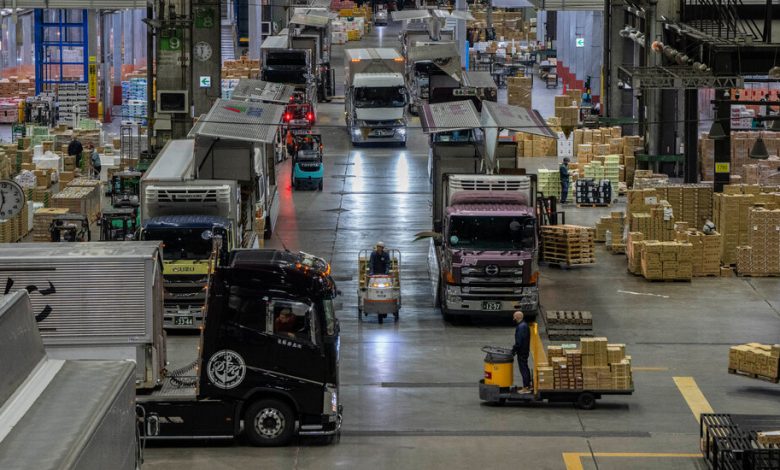How a Crisis in Truck Driving Could Change Life in Japan

It was dark when Daiki Funamizu pulled his truck into the market in Osaka, ending a 15-hour haul down Japan’s main island. He rubbed his sore back and wiped the sweat off his forehead. Then he began several more hours of work to unload 500 boxes of red apples.
Mr. Funamizu, 35, said he used to like driving. But now, with drivers getting stretched thinner as Japan’s population shrinks and workers desert the industry, “I must say I hate it,” he said.
Japan’s trucking industry is a crucial cog in one of the world’s largest economies, and it is the lifeblood of the Japanese culture of ultra-convenience. But it, and its drivers, are under immense strain. To improve job conditions and make the work more appealing, the government is moving to cap overtime for the first time next year, easing the punishing hours that have long defined trucking in Japan.
Addressing that problem, however, will create others — potentially disrupting the nation’s entire logistics system. It is unlikely that enough drivers of big rigs and delivery trucks can be hired anytime soon to make up for the lost overtime hours. The shortfall could leave supermarket shelves bare of some items and threaten the speedy door-to-door shipping — luggage to the airport, or golf clubs to and from the resort — to which Japanese people are accustomed.
Officials are calling it the “2024 problem.”

Daiki Funamizu, a long-distance truck driver in Japan, said the job’s strains had taken the pleasure out of it.
“I believe this is going to be a hard landing,” said Mikio Tasaka, a research fellow at NX Logistics Research Institute and Consulting, a think tank in Tokyo.
The government is being spurred to action as workers in a range of industries push back against an extreme Japanese work culture that leaves little room for work-life balance and has even led to deaths from overwork.
Overtime will also be limited for construction laborers, doctors, and drivers of buses and taxis — workers who, like truckers, often put in very long hours because of labor shortages in a country with 130 job openings for every 100 applicants.
Their industries, too, are bracing for a shock. But the challenge will be particularly acute for trucking.
More than 90 percent of cargo in Japan travels by road, compared with about 73 percent in the United States. With the lost overtime hours, analysts are estimating a 14 percent deficit in delivery capacity next year.
Some drivers work 100 overtime hours or more each month, because the work demands it or they need the extra pay. But starting in April, overtime will be capped at a monthly average of 80 hours, or a daily limit of 15 work hours.
By the end of the decade, according to government estimates, a third of Japan’s cargo could be left undelivered, resulting in a $70 billion economic hit in 2030 alone. Mr. Tasaka, the logistics researcher, warned that the disruptions could cause “a kind of recession.”
Already, before the overtime cap is enacted, the effects of the driver shortage have been widely felt.
Convenience stores are reducing lunch box deliveries to twice daily from three times. Supermarket chains are allowing an extra day for delivery and avoiding overnight shipping. They are also trying to share distribution centers and standardize box sizes under the government’s direction.
After the new overtime rules take effect, one- or two-day deliveries might no longer be possible, economists say. There might be less fresh seafood and fewer fruits and vegetables in grocery stores. Costs for shipping could jump 10 percent. Shipping might be unavailable for some customers during peak seasons like Christmas and New Year’s.
In Aomori, a northern Japanese prefecture famous for its apples, farmers are worried that delayed deliveries and rising shipping costs will hurt demand. “Without truck operators, we can’t ship,” said Shoji Naraki, 55, an apple farmer in Aomori.
In addition to the labor shortage, the trucking industry is constrained by outdated practices, molded by the habits of people elsewhere in the supply chain, such as suppliers and retailers. That makes it difficult to find new efficiencies.
“It’s not so easy to make changes all at once in this industry,” said Haruhiko Hoshino, an official at the association representing Japan’s trucking industry, referring to its interdependent nature.

Mr. Funamizu stacking boxes with Tetsuya Mikami at his third stop.CreditCredit…Photographs and Video by Hiroko Masuike/The New York Times
Trucks in Japan do not have detachable trailers, unlike trucks in much of the developed world. Cardboard boxes are not standardized — there are 400 different sizes for shipping oranges, for example.
“Standardization in the logistics industry is very behind in Japan,” said Yuji Yano, who studies delivery systems at Ryutsu Keizai University in Japan. “Pallet sizes are not standardized. Manufacturers and wholesalers don’t use standardized data sharing systems.”
The lack of uniformity means cargo must be loaded and unloaded by hand — work performed by forklifts in other countries but by truck drivers in Japan, who are often not paid for that labor because it is not part of their contracts, experts say.
In Aomori, these deeply entrenched practices mean that a line of truck drivers must wait hours for their turn in the apple loading yard.
“Drivers work too much,” said Mr. Funamizu, the trucker who recently made a produce run from Aomori to Osaka. “I don’t think the distribution system in Japan will change — you can’t help it.”
The Japanese government has proposed a series of incremental changes to soften the blow to the trucking industry.
Officials have asked shippers to pay trucking companies fair fees. They have urged them to create more efficient processes to reduce the time that drivers must wait to load and unload trucks. They have called on shippers to more frequently use alternative means of transport, such as trains and ships. They are also considering raising highway speed limits for trucks to 100 kilometers per hour, from 80.
Prime Minister Fumio Kishida has said he will work to increase truck drivers’ pay, promised subsidies for logistics businesses to update their systems and urged residents to be home when their deliveries are scheduled to arrive, pointing to the need to reduce repeat deliveries that slow drivers.
Trucking companies are also considering changes, including allowing foreign workers to become truck drivers. (There are currently 200 openings for every 100 trucking applicants.) But driver’s licenses in Japan require proficiency in Japanese, a skill that foreign workers are less likely to have.
Some drivers, even as they lament their working conditions, say they are against the overtime limits. They are worried about pay cuts, given that it may be difficult to raise drivers’ pay and make up for lost overtime earnings if consumers resist higher shipping costs.
Tomoyasu Matsuyama, 31, who earns about $3,060 a month delivering fruits and vegetables, said he expected his monthly pay to be reduced by $600 once the overtime curbs went into effect.
Trucking companies, too, are being squeezed, by rising fuel prices and vehicle maintenance costs, said Hiroyuki Utsunomiya, 74, the president of a trucking company in Miyagi Prefecture. “When the regulation is tightened in 2024, it will be tougher to do business,” he said. In Aomori, the governor has asked the government to relax the rules for truck drivers in his prefecture.
Still, Japan’s transport ministry appears firm on the new overtime limits, which have already been delayed by five years.
“We definitely won’t extend the moratorium,” said Yudai Furukawa, the ministry’s deputy director of logistics policy. “There is nothing more precious than people’s lives.”




